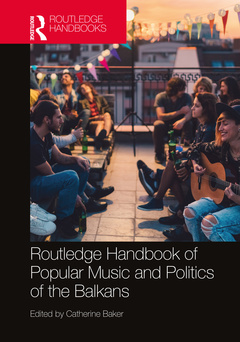The Routledge Handbook of Popular Music and Politics of the Balkans Routledge Music Handbooks Series
Coordonnateur : Baker Catherine

The Routledge Handbook of Popular Music and Politics of the Balkans is a comprehensive overview of major topics, established debates and new directions in the study of popular music and politics in this region.
The vibrant growth of this subject area ever since the 1990s has been intertwined with the region?s political and socio-economic transformations, including the collapse of state socialism in much of the region, the break-up of Yugoslavia, the advent of neoliberal capitalism, the rise of Romani activism, the complex politics of ?Europeanization? before and after the global financial crisis, and the region?s relationship to the European Union border regime. The handbook illustrates the wide range of disciplines and methods that contribute to this field?s interdisciplinary dialogue and highlights emerging approaches such as the study of Black diasporas in the region, popular music?s links with LGBTQ+ communities, and the impact of digital technologies on musical cultures.
This volume will benefit specialist researchers, tutors creating or refreshing courses on popular music in the region, and students interested in these topics, especially those who are at the point of developing their own independent research projects.
List of figures
List of tables
List of contributors
Acknowledgements
Introduction: Thinking Politically with Popular Music of the Balkans
Part 1: Region and ‘the Balkans’ in Practice
1 The Emergence of the World Music Concept in the Balkans: Early and More Recent Steps
2 Lăutari, Music-Making, and Social Practices of Live Performance in Southern Romania
3 Politics, Activism, and Romani Music: Interpreting Trends in Serbia, North Macedonia and Bulgaria
4 Electronic Dance Music Festivals in Romania: a Case of Reversed Balkanism
5 The Balkans in the Eurovision Song Contest
Part 2: Reviving and Revising Histories
6 Reviving Nineteenth-Century Wallachian and Moldavian Urban Music
7 Bosnian Discography Before World War I: Recording Artists, Repertoire and Politics
8 The Development and Institutionalization of Albanian Music During the Communist Period
9 ‘Please, Mile, Don’t Sing Anything Political’: Turbo-Folk, Politics and the Restoration of Capitalism in Serbia
10 The Artistic Units of the Army of the Republic of Bosnia-Herzegovina (ARBiH), Popular Patriotic Music Production and the Question of National Identity in Bosnia-Herzegovina During the War from 1992 to 1995
11 The Politics of Performance and Popular Music in Turkey
12 Songs After Genocide: Music of Hatred and Triumphalism
Part 3: Defining ‘the Popular’
13 Popular Music and the ‘Mass Culture’ of Socialist Yugoslavia in the Eyes of Critics and Theorists
14 To traghoúdhi tou nekroú adelfoú: Mikis Theodorakis’ Autoethnographic and Political Perspectives in a Contemporary Greek Laiki Tragedy
15 Groovy Aesthetics, Intercultural Perspectives, and the Rise of Ethnojazz in Bulgaria
16 The Sound of Distinction: Social Class and Political Orientations as Predictors of Music Taste in Croatia
17 Popular Culture and Pandemic Politics: Musically Mitigating COVID-19 in 2020 Bulgaria
Part 3: Political Economies and Political Aesthetics
18 Women and Gender in the Early Record Industry in Former Yugoslavia: Snapshots of Singers, a Composer, Industrial Manpower, and Gendered Humour
19 The Musical Film Genre in Romanian Cinema: From Melodramatic Socialism to Postmodern Irony
20 In Search of National Style: Yugoslav Popular Music Between the Balkans and the Mediterranean
21 How Do You Solve a Problem Like Korea?: Laibach and the Poetics of Politics
22 White Power Music and Antifascist Rap: Anti-System Music in Greece During the 2009–21 Crises
23 Popular Culture or Resistance?: Rap and Politics in Turkey Since the 1990s
Part 4: Margins of National Identity
24 The Neopontic Music of Greece: Traditions of Modernity and the A/politics of Identity
25 Just Mediterranean, Please: Croatian Neoklapa Music and National (Re)Positioning
26 Between the Virtual and the Make-Believe: Anthems, Bells, and a Performance for Liberland Along the Croatian and Serbian Danube
27 Queering Bulgarian Pop-Folk: Hybridity, Gaga Feminism, and Defamiliarization in Chalga
28 Understanding Gender and Sexuality in Sevdah as a Popular Genre
Part 5: Globalizing Postcoloniality and Race
29 Black Popular Musics in Yugoslavia
30 ‘The Blacks of Yugoslavia’: Racialization, Resistance, and Kosova’s ‘MTV Generation’
31 Br/otherhood and Dis/unity: Racial Differentiations Across the Former Yugoslav Region and Serbian Diaspora Communities in Serbia’s Two Major Music Festivals
32 What is this ‘Balkan’ in Balkan Popular Culture?: Stuart Hall’s Sociology of Popular Culture, Identity and Race through Analogy and Connection
33 From AfroGreeks to the Black Mediterranean: De/facing Whiteness in the Rap of Negros tou Moria
Part 6: New Technologies and Transformations
34 Stacking Nightingales, Male Tears, and Albums of the Year: How the Balkans and Other Scales of Domestic Hip-Hop Are Crafted
35 ‘Popularity’ in the YouTube Era: an Anthropological Analysis of Music Trending on Serbian YouTube and IDJTV
36 From Turbo Music to Turbo Politics: Pop-Folk and Anti-Establishment Politics in Bulgaria
37 ‘Dajem ti srce, zemljo moja’: Patriotic Music and National Unity in Croatia in the Aftermath of the 2020 Petrinja Earthquake
38 ‘And Then We Sang’: Affective Communities and Russian/EU Cultural Diplomacy in Moldova’s Victory Day and Europe Day, 2022
39 Queer Yugosphere: Queer Audiences and Popular Music in the Post-Yugoslav Space
Index
Catherine Baker is Reader in 20th Century History at the University of Hull.
Date de parution : 07-2024
17.4x24.6 cm
Thème de The Routledge Handbook of Popular Music and Politics of... :
Mots-clés :
Balkans; Popular Music; Politics; state socialism; neoliberal capitalism; Yugoslavia



